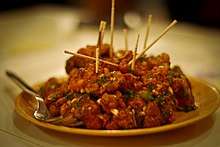Gobi Manchurian
Gobi Manchurian is an Chinese Indian fried cauliflower dish.[1]
 Gobi Manchurian | |
| Course | Snack |
|---|---|
| Place of origin | India |
| Region or state | West Bengal |
| Main ingredients | Cauliflower |
| Ingredients generally used | Chopped onion, capsicum, garlic |
Gobi (cauliflower) Manchurian is the result of the adaptation of Chinese cooking and seasoning techniques to suit Indian tastes and has become a staple of Indian Chinese cuisine. The word Manchurian means native or inhabitant of Manchuria. It was originally developed by a small Chinese community which lived in Kolkata since the British Raj. In its two-stage preparation, the first stage requires preparing a spiced corn flour batter, dipping cauliflower florets in it and deep frying them. In the second stage, the deep fried florets are sautéed with chopped onion, bell pepper, garlic, etc., in soy and chili sauce.
There are two different variants of gobi Manchurian, dry and with gravy. Both variants are prepared by using common ingredients like cauliflower, corn flour, maida flour, spring onion, bell peppers, soy sauce, chili sauce, minced garlic, ground pepper, etc. and has typical garnish of spring onion. Some recipes call for use of monosodium glutamate (MSG) to increase the taste profile, though there are those who avoid it due to possible health issues.[2] Its taste can vary from mild spicy to hot and fiery based on the recipe and personal preference.
Variations
Gobi Manchurian dry

It has cauliflower fritters in comparatively dry sauce like texture and is typically served and enjoyed as a snack or starter with tomato ketchup as dipping sauce. It is popular among alcohol drinkers as a bar snack and can be found in almost all bar restaurants.
Gobi Manchurian gravy
It has cauliflower fritters in a thick sauce like spicy gravy curry made of corn flour. It is generally served with varieties of rice dishes like steamed rice, Chinese fried rice, Szechuan fried rice, in the main course.
References
- Laxmi Parida (2003). Purba: Feasts from the East: Oriya Cuisine from Eastern India. iUniverse. p. 191. ISBN 978-0-595-26749-1.
- "Science suggests MSG really isn't bad for your health after all".